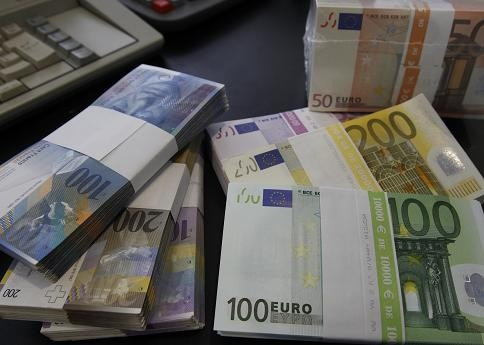Swiss franc ignores strong GDP numbers, falls to 18-month low vs dollar with USD index at 68-month high

The Swiss franc ignored a better than expected Q3 GDP data from Switzerland and fell to a 1-1/2-year low against the dollar ahead of US non-farm payroll data.
Analysts also believe the impact of the failure of the Swiss referendum over the weekend and the broad dollar strength continued to weigh on the franc.
The USD index, the gauge that measures the trade weighted strength of the greenback against a basket of major currencies, has risen to a 68-month high of 0.8890 on Wednesday. A break of 0.8917 will take it to its highest since April 2008, an 80-month high.
Had the referendum been approved, it would have compelled the Swiss National Bank to more than double its gold reserves and banned it from ever selling the metal.
It will then be less powerful in defending the EUR/CHF floor of 1.20, especially with the ECB is set to further expand stimulus measures to shore up growth and reflate the region.
USD/CHF jumped to a high of 0.9764, its highest since late May 2013, and up from the previous close of 0.9723. The Swiss currency has weakened more than 1% against the greenback so far this month.
The franc has also weakened against the yen and the pound. CHF/JPY slipped to 122.25 from Monday's close of 122.63 and GBP/CHF rose to 1.5287 from 1.5207.
Data on Wednesday showed that Swiss GDP increased 1.9% from a year earlier in the third quarter when analysts were expecting a growth of 1.4%. The previous quarter's annual rate was revised sharply to 1.6% from 0.6%.
On a quarterly basis, the Swiss economy expanded 0.6%, compared to the Q2 reading of 0.3% which analysts expected to repeat this time.
Another data, released on Monday, may have continued to weigh on the franc.
The SVME purchasing managers' association and Credit Suisse said that its PMI index declined to a seasonally adjusted 52.1 in November from 55.3 in October when analysts had been expecting a softer fall to 52.9.
The rallying dollar also had its impact on the rest of the forex world more so with the market expecting the US non-farm payrolls for November, due Friday, to print stronger numbers.
Market expectations are for a rise in the non-farm job addition to 232,000 from 214,000 recorded for October.
Stanley Fischer, the Vice Chairman of the Federal Reserve, said on Tuesday that the timing of the first rate increase in the US remains dependent on broader economic data.
"If the labor market continues to strengthen, and if we see some signs of inflation beginning to increase, then the natural thing is to get the interest rates up," he said.
© Copyright IBTimes 2025. All rights reserved.






















